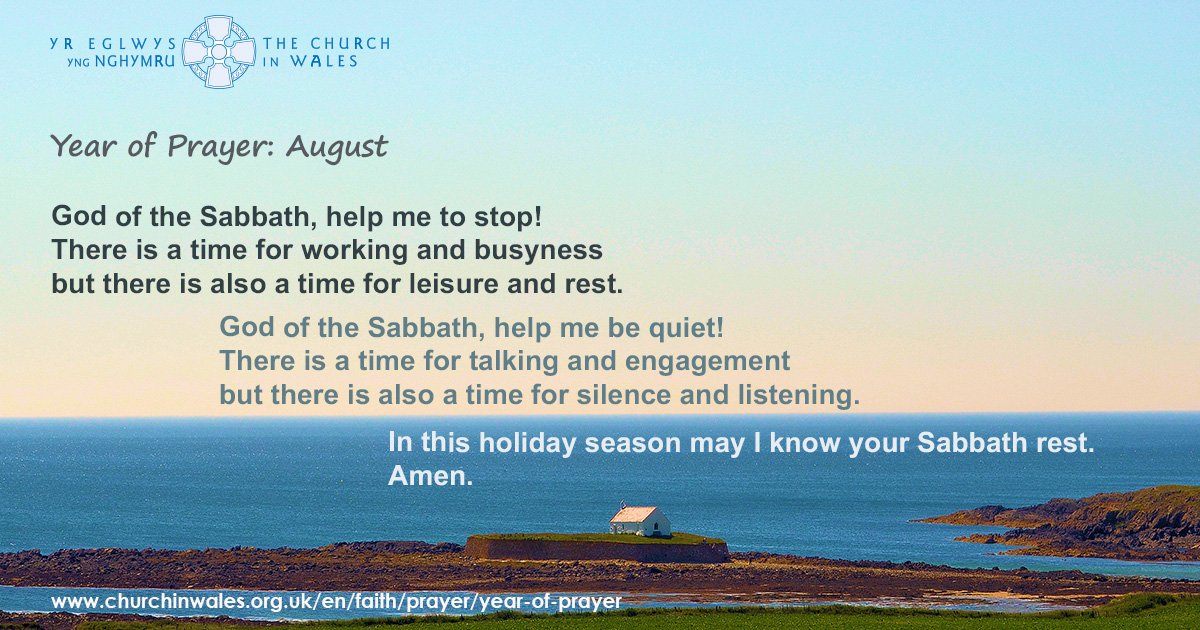August 2023 - Holiday
Welcome to the August Prayer, and the last in our series of 12. Each month has given us the opportunity to explore different themes and different ways of praying which we hope you will have found helpful as ways in which to encounter God. In September there will be a film by Bishop John to close the Year of Prayer. The Provincial Spirituality Group in the Church in Wales.
Introduction

School is out. The sun is shining. For many of us August is the time of year when we enjoy a break from our normal routine, when the pace slackens and we have time to breathe more deeply. It is a month associated with holidays. ‘Holiday’ is our theme for this month. Today the word ‘holiday’ is interchangeable with ‘vacation’ but it has its origins in the term ‘Holy Day’ - a day which is especially given by God for the well-being of humanity. During our holidays, we can rest and have a little more time to be aware of God’s goodness and love. It is closely related to the idea of ‘sabbath’.
Our way of prayer this month is the prayer of silence.
How do you feel at the prospect of stopping, spending time in silence before God, simply attentive to God’s loving presence?
Our lives are so busy and our world is so noisy, that it can be very difficult and even a little scary to be still and silent.

Reflection
The sabbath is given as a day of rest in Genesis when God rested from the act of creation:
‘And on the seventh day God finished the work that he had done, and he rested on the seventh day from all the work that he had done. So God blessed the seventh day and hallowed it, because on it God rested from all the work that he had done in creation.’ (Genesis 2. 2-3)
The sabbath is also given as a time for the Israelites to remember that they have been freed from slavery in Egypt. We read about this in Deuteronomy:
‘Remember that you were a slave in the land of Egypt, and the Lord your God brought you out from there with a mighty hand and an outstretched arm; therefore the Lord your God commanded you to keep the sabbath day.’ (Deuteronomy 5. 15)
There are also many festivals - holy days - spoken of in the Bible when people refrained from work and made space for God. Many of us are familiar with reading about the Festival of the Passover, given in the Old Testament and kept by Jesus and his disciples in the New Testament. So sabbath days, holy days, holidays, are a time when we can recognise our God-given freedom, relax from our usual activities and enter into rest. We can shake off those things which threaten to enslave us.
We may not literally be slaves but our modern society holds so many things which can threaten our freedom and our peace. We can so easily become ‘workaholics’, or become addicted to our technology, or even become a slave to the demands of other people. The story of Mary and Martha, found in the gospel of Luke, reminds us that sitting attentively at the feet of Jesus is the one things which is needful:
‘Now as they went on their way, he entered a certain village, where a woman named Martha welcomed him into her home. She had a sister named Mary, who sat at the Lord’s feet and listened to what he was saying. But Martha was distracted by her many tasks; so she came to him and asked, ‘Lord, do you not care that my sister has left me to do all the work by myself? Tell her then to help me.’ But the Lord answered her, ‘Martha, Martha, you are worried and distracted by many things; there is need of only one thing. Mary has chosen the better part, which will not be taken away from her.’ [Luke 10. 38-42]
So, you are invited, with Mary, to rest from ‘doing’ and enter into ‘being’, to leave activity and even to leave the burden of words behind. This month you are invited to into a prayer of attentive silence.
The Prayer of Silence
There are many ways of helping our hearts to enter into a silent place where we are simply in God’s presence. We will follow a pattern which has a lot in common with some secular mindfulness practice but is a deeply Christian tradition, predating this modern, secular use. The pattern we are offering is one which you will find used by the World Community for Christian Meditation (see ‘Further Suggestions’ below for their website and app). This way of praying can take time to develop so, if you can, it is helpful to set aside a little time to pray in this way each day. Aim towards 20-30 minutes but start with 5-10 minutes if a longer time feels challenging.
Choose a time and place where you are unlikely to be disturbed. Sit in a way in which you are comfortable but alert - relaxing in an easy chair might encourage you to doze off! For the same reason, it may be best to avoid trying to pray after a heavy meal. But if you do find yourself nodding off, please don’t give yourself a hard time, simply return to your prayer having thanked God for the gift of sleep! It may be helpful to set a timer so that you are not distracted by looking at the clock. Choose a gentle, quiet sound to mark the completion of the time or it will be a jarring end to your silence.
Choose a word which signifies your trust in God (such as ‘Yes’; ‘Love’; ‘Presence’, ‘Jesus’). Another traditional word to use in this way is ‘Maranatha’ which means ‘Come, Lord’. Offer your time of prayer to God in these words, or words of your own:
My God, gentle and strong, I trust myself to you.
Help me to know your presence, leaving aside everything that takes me from you.
Amen.
Take a few gentle breaths and begin to use your chosen word either quietly out loud, or silently in your heart. If (when!) you become distracted by thoughts or feelings, very gently return to your prayer word. Each distraction becomes a precious opportunity to come back to God! When you reach the end of your time, pause for a moment, then offer a prayer to mark the end of your silence. Use these words, or words of your own:
Let me know your steadfast love, for I put my trust in you.
Lead me in the way that I should go, for to you I lift up my soul.
(Adapted from psalm 143 v8)
This is only one way of entering that silent place where we meet with God and our inner selves. Sometimes it happens spontaneously when we encounter something very beautiful or awe inspiring - a huge mountain range, a vast ocean, a work of art or piece of music. Other ways of praying may bring us to the same place of deep silence. See, for example Lectio Divina (which we met in February). Such slow reading of scripture can bring us to a still, silent place.
The traditional ‘Jesus Prayer’ is another - ‘Lord Jesus Christ, Son of God, have mercy on me, a sinner’. This can be said in time with your breathing until your breathing itself becomes a prayer. You might like to find out more about the Jesus Prayer and ways of using it by searching online, or see the book recommendation below.
Concluding prayer
Holy God,
may this holiday season be for me a holy season.
Help me to be still.
Help me to quieten.
Draw me into the depths of your compassion
where I may meet your loving presence
and gaze on you in silent adoration.
Amen.
Further Resources
Websites:
The World Community for Christian Meditation
Contemplative Outreach
https://www.contemplativeoutreach.org
App:
Centering Prayer (Contemplative Outreach)
Books:
Into the Silent Land: The Practice of Contemplation by Martin Laird
[Darton,Longman & Todd Ltd 2006]
The Jesus Prayer by Kallistos Ware
[Catholic Truth Society 2017]
Poem:
‘Let your God love you’ by Edwina Gateley
https://www.journeywithjesus.net/PoemsAndPrayers/Edwina_Gateley.shtml
What Next?
We hope that you have found these reflections and prayers over the last 12 months helpful as a way of deepening your prayer life and encountering God. The prayers can still be found on the website if you would like to revisit them.
If you feel as though you would like someone to talk to about your prayer, faith and life, then each diocese has a number of people whose ministry is as a spiritual director or companion on the way; they will listen as you seek to deepen your prayer and relationship with God. More information on this can be found on the website by searching for ‘spiritual direction’, this will take you to ‘convenors of spiritual direction’ and a list of people, convenors, one for each diocese who will be able to help you and answer any questions you may have.